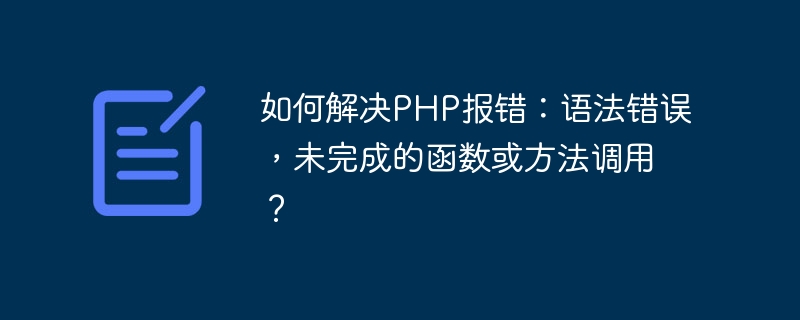

How to solve PHP error: syntax error, unfinished function or method call?
In the process of developing PHP applications, we may often encounter the error message "Syntax error, unfinished function or method call". This error usually indicates that there are some syntax problems in the code or errors in function or method calls. In this article, we will cover some common ways to resolve these errors and provide some code examples to help readers understand better.
First, let’s look at some common issues that can cause this type of error:
// 错误示例 echo "Hello World" // 正确示例 echo "Hello World";
// 错误示例
myFunction();
// 正确示例
function myFunction() {
// 函数的具体实现
}// 错误示例
function sum($a, $b) {
return $a + $b;
}
$result = sum(10);
// 正确示例
function sum($a, $b) {
return $a + $b;
}
$result = sum(10, 5);Next, we will introduce some ways to solve these errors:
Finally, let us look at some sample code to help readers better understand and solve these errors:
// 示例1:缺少分号
echo "Hello World"
// 示例2:调用未定义的函数
myFunction();
// 示例3:缺少函数参数
function sum($a, $b) {
return $a + $b;
}
$result = sum(10);
In these sample codes, we can see the specific errors And workaround:
To summarize, solving the PHP error "Syntax error, unfinished function or method call" requires careful inspection of the code, use of editors, error messages, and debugging tools. Through these methods, we can better locate and resolve errors in our code and ensure that our applications function properly. I hope the content of this article can help readers better understand and solve such problems.
The above is the detailed content of How to solve PHP error: syntax error, incomplete function or method call?. For more information, please follow other related articles on the PHP Chinese website!
 Computer 404 error page
Computer 404 error page
 Solution to the Invalid Partition Table prompt when Windows 10 starts up
Solution to the Invalid Partition Table prompt when Windows 10 starts up
 How to solve the problem of missing ssleay32.dll
How to solve the problem of missing ssleay32.dll
 How to set IP
How to set IP
 How to open state file
How to open state file
 Why is the mobile hard drive so slow to open?
Why is the mobile hard drive so slow to open?
 What are the basic units of C language?
What are the basic units of C language?
 What platform is Kuai Tuan Tuan?
What platform is Kuai Tuan Tuan?




